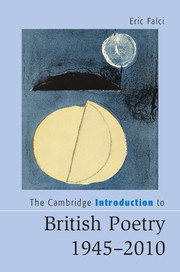Book contents
- Frontmatter
- Contents
- Acknowledgments
- Introduction
- Chapter 1 The Movement and Its Discontents
- Chapter 2 Decolonizing Poetry
- Chapter 3 Local Modernism
- Chapter 4 Late Modernism
- Chapter 5 The North
- Chapter 6 New Narratives
- Chapter 7 Platforms and Performances
- Conclusion: Archipelagic Experiments
- Notes
- Further Reading
- Index
- Cambridge Introductions to Literature
Chapter 3 - Local Modernism
Published online by Cambridge University Press: 05 November 2015
- Frontmatter
- Contents
- Acknowledgments
- Introduction
- Chapter 1 The Movement and Its Discontents
- Chapter 2 Decolonizing Poetry
- Chapter 3 Local Modernism
- Chapter 4 Late Modernism
- Chapter 5 The North
- Chapter 6 New Narratives
- Chapter 7 Platforms and Performances
- Conclusion: Archipelagic Experiments
- Notes
- Further Reading
- Index
- Cambridge Introductions to Literature
Summary
The twin pressures of decolonization and devolution have shaped Britain in the latter half of the twentieth century and into the early decades of the twenty-first. These pressures joined with others to force a large-scale rethinking of the “place” of Britain – as an archipelago, a set of differentially interlocking internal geographies, and an island nation balancing its relationships with the United States, the Commonwealth, and, somewhat more warily, Europe. As Britain's empire diminished, and as the status of the Celtic areas of the British Isles shifted within emerging devolutionary and nationalist movements, the unspoken stability of the English center could not hold. The far peripheries of the British Empire disintegrated, while the near peripheries reconsidered their relationship to the metropole.
Poets like Hugh MacDiarmid and Edwin Muir in Scotland, R.S. Thomas in Wales, and John Hewitt in Northern Ireland sought to articulate distinct cultural and political spheres outside England and Englishness while still necessarily operating within a larger British ambit. Thomas's Welsh nationalism was tied to a bracing conservatism, whereas MacDiarmid, a lynchpin of the Scottish nationalist movement that gained momentum throughout the century, routed his nationalism through his commitment to communism. This pairing proved thorny, and MacDiarmid, famously, was kicked out of the Scottish Nationalist Party for his communist beliefs and out of the Communist Party for his nationalism. John Hewitt's formulation of regionalism and his articulation of a distinctive Ulster geographical, social, and cultural space was meant in part as a bulwark against both Irish nationalism and an exclusively Anglo-Protestant version of Northern Ireland. Such imaginative and cultural readjustments were occurring within the space of a changing England as well. Postwar deindustrialization and suburbanization reshaped many cities and their hinterlands and altered the relationships among the country's regions, especially between the southeast (the home counties and an ever-spreading London) and the midlands and the north. The homogenizing effects of a rising consumer culture and an infiltrating mass media (heavily influenced by American culture) threatened the vitality of local practices and, in certain ways, reinforced the hegemony of the metropolitan center. At the same time, the potential loss of regional specificity sparked an interest in local histories and traditions.
- Type
- Chapter
- Information
- The Cambridge Introduction to British Poetry, 1945–2010 , pp. 68 - 90Publisher: Cambridge University PressPrint publication year: 2015

